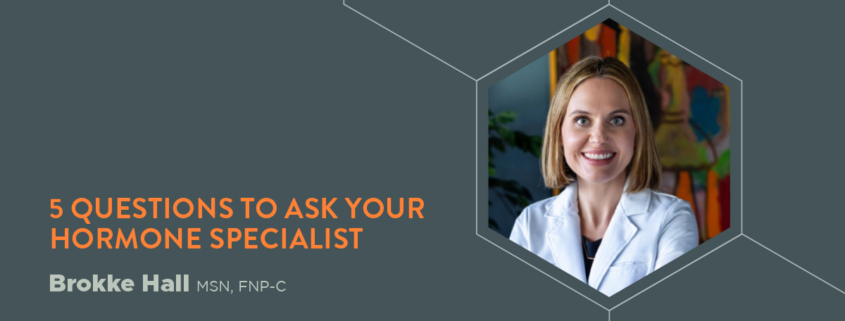5 Questions to Ask Your Hormone Specialist: Brokke Hall, MSN, FNP-C
Navigating hormone therapy can be an overwhelming process, but asking the right questions to your specialist will help you feel empowered to determine your best treatment path.
To give you expert insights, we’re introducing a new Q&A series featuring Exceed’s Nurse Practitioners. Each month, one of our providers will answer common questions about hormone therapy, helping you make informed decisions while also getting to know the team that’s here to support your health journey.
This month, Brokke Hall, MSN, FNP-C, is answering five key questions about hormone therapy—who it’s for, what to expect, and how to get started.
1. Am I a Candidate for Hormone Therapy?
We get this question a lot, and many inquiries revolve around age.
- Am I too old? Absolutely not! Hormone replacement therapy (HRT) offers significant benefits for cardiac and bone health, even if you’ve already been through menopause. Studies have shown that maintaining hormone balance can help reduce the risk of osteoporosis and cardiovascular disease, improving longevity and quality of life.
- Am I too young? Probably not, but it depends. If you’ve finished family planning and use a non-oral birth control method, you may be a good candidate for HRT. The best way to determine if hormone therapy is right for you is through comprehensive lab testing and a consultation with a qualified provider.
2. What Are the Symptoms of Low Hormone Levels?
Many symptoms of hormone imbalance go unnoticed or are mistaken for other health concerns. If you’ve been experiencing unexplained symptoms, it may be time to check your hormone levels.
Here are some common symptoms that could actually be surprising signs of low hormone levels:
- Joint pain and stiffness, often mistaken for arthritis
- Itchy or dry skin that doesn’t improve with topical treatments
- Cognitive issues, including brain fog and memory lapses
- Irritability and mood swings that feel out of character
- Depression and persistent low mood
- Lack of motivation and general fatigue
- Poor sleep or trouble falling and staying asleep
- Itchy ears, an unusual but common symptom
- Vaginal dryness, leading to discomfort or irritation
- Pain with intercourse, which can impact intimate relationships
- Difficulty achieving orgasm, affecting overall sexual wellness
If any of these sound familiar, it may be worth discussing hormone therapy with your provider. Identifying and addressing low hormone levels early can prevent long-term complications and enhance overall well-being
3. Where Can I Learn More About Hormone Therapy?
If you want to dive deeper into the science and benefits of HRT, check out these trusted resources:
- The M Factor documentary – An excellent deep dive into how hormones impact overall health
- Dr. Mary Clare Haver – A leading voice in hormone health education – be sure to follow her on social media
- Estrogen Matters – A comprehensive look at the benefits of estrogen therapy
- Peter Attia’s podcasts and books – resources for longevity and health optimization
By educating yourself on hormone therapy, you’ll be well-positioned to make informed decisions about your health. Our team at Exceed is also available to answer any questions and guide you through the process
4. What are the Benefits of Hormone Therapy?
HRT isn’t just about symptom relief—it’s about achieving long-term wellness. Some of the benefits include:
- Improved overall health – Restoring hormone balance can help with mood regulation, cognitive function, and energy levels.
- Stronger bones – Estrogen plays a critical role in maintaining bone density and preventing osteoporosis.
- Better heart health – Balanced hormones support cardiovascular function and may lower the risk of heart disease.
Many patients also report improvements in skin elasticity, muscle tone, and metabolism. The positive effects of hormone therapy go beyond treating symptoms, helping you feel more vibrant and youthful as you age.
5. What Types of Hormone Replacement Therapy Are Available?
There are several ways to receive HRT, including:
- Creams – Applied directly to the skin for absorption.
- Patches – A transdermal option that delivers hormones gradually.
- Pills – An oral method that requires consistent dosing.
- Shots – Injections administered at regular intervals.
- Pellet therapy – A long-lasting method that provides steady hormone levels over time.
At Exceed, we specialize in pellet therapy because it offers a consistent, time-released delivery of hormones, minimizing fluctuations that can occur with other methods. Unlike oral or topical treatments that require daily administration, pellets provide a steady dose over several months. Additionally, our licensed and trained providers personalize your dosage based on lab results and how you feel—not a one-size-fits-all algorithm. This ensures that you receive the most effective and tailored treatment for your individual needs.
Bonus Question: Do I Have to Do This (HRT) Forever?
No! Your health priorities may shift over time, and you can pause or stop pellet therapy whenever you choose. Some patients continue therapy for several years due to its health benefits, while others opt to take breaks to reassess their needs.
If you decide to stop, follow your provider’s guidance on progesterone or other supplements to maintain balance. Should you wish to restart, just call our office to discuss the next steps. We’re here to support you at every stage of your hormone health journey.
Taking control of your hormone health starts with asking the right questions. By staying informed and working with a knowledgeable provider, you can make the best choices for your well-being. Stay tuned next month when another Exceed Nurse Practitioner answers more of your HRT questions!









